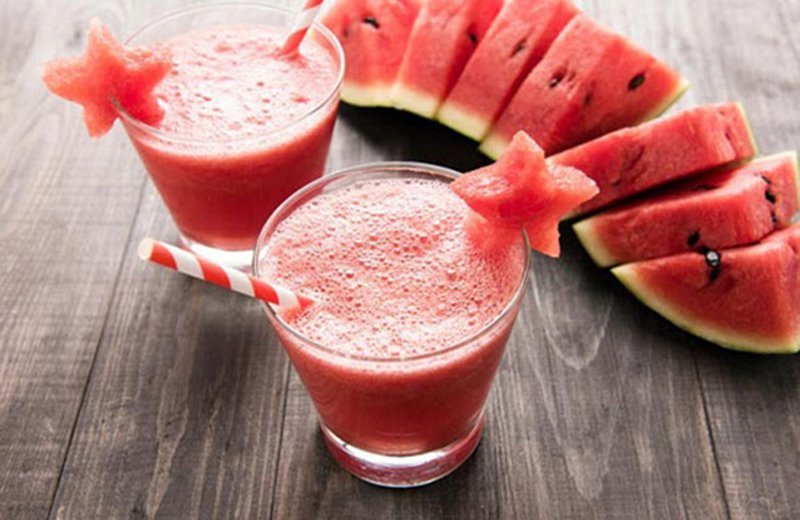Watermelon is one of the favourite fruits of many people every hot summer. This fruit not only has a sweet and refreshing taste but also brings certain health benefits because it contains many essential nutrients, such as vitamins, minerals and plant compounds.
1. What is watermelon?
Watermelon (Citrullus lanatus) is a large fruit, originating from southern Africa, in the same family as cantaloupes, zucchini, pumpkins and cucumbers.
Watermelon usually has a cool sweet taste and contains only 46 calories per cup, but is rich in vitamin A, vitamin C and other plant compounds such as citrulline and lycopene that are good for health.
Besides, this type of melon also brings many health benefits to users, including improving insulin sensitivity, reducing muscle pain and lowering blood pressure.
Watermelon is often eaten directly, kept cold, and made into juice or smoothies.
2. Nutritional value of watermelon
The main ingredients in watermelon are water (91%) and carbs (7.5%). On the other hand, watermelon has almost no protein or fat and is extremely low in calories.
Here are the nutritional facts in 2/3 cup (100 grams) of watermelon, including:
- Calories: 30
- Country: 91%
- Protein: 0.6 grams
- Carbs: 7.6 grams
- Sugar: 6.2 grams
- Fiber: 0.4 grams
- Fat: 0.2 grams

91% of watermelon is water
2.1. Carbs
One cup of watermelon (152 grams) contains 12 grams of carbs, mainly simple sugars, including fructose, glucose and sucrose. In addition, watermelon also provides very little fibre.
Besides, the glycemic index (GI – a measure of how food affects blood sugar after a meal) of watermelon ranges from 72-80, reaching a high level. However, because watermelon contains quite a few carbs, it does not affect blood sugar levels much.
2.2. Fiber
2/3 cup (100 grams) of watermelon provides only about 0.4 grams of fibre. However, the fructose content of watermelon is quite high in FODMAP, aka fermentable short-chain carbohydrates. Therefore, eating large amounts of fructose can cause unpleasant digestive symptoms because the body cannot fully digest them, such as bloating, constipation, gas, or diarrhoea.
2.3. Vitamins and minerals
Watermelon is a fruit that provides many essential vitamins and minerals for the body, such as vitamin C, vitamin A, vitamin B5 or potassium.
Vitamin C: accounts for a large proportion of watermelon, acts as an antioxidant, helps improve skin health and enhances immune system function.
Vitamin B5: also known as pantothenic acid. This is a water-soluble vitamin, found in many foods such as peanuts, milk, cheese, broccoli, etc. This vitamin helps prevent infection, ageing, and inflammation. increase resistance, and reduce the risk of diseases such as asthma or heart disease.
Vitamin A: Watermelon contains beta carotene, which when entered the body will be converted into vitamin A. This vitamin plays an extremely important role in health, including the treatment of gastrointestinal diseases, and skin problems, preventing diabetes and cancer.

Beta carotene in watermelon will convert to vitamin A
Potassium: helps control blood pressure and protects heart health.
Copper: is an important mineral for the body, helping to prevent cancer, prevent oxidation and improve nervous system functions.
2.5. Other plant compounds
Although watermelon provides fewer antioxidants than other fruits, it is rich in the amino acids citrulline and lycopene, which are antioxidants that provide many health benefits:
Citrulline: occurs most in the white rind surrounding the watermelon flesh. Citrulline when in the body will be converted into the amino acid arginine. Both of these substances have an important role in the synthesis of nitric oxide, which helps reduce blood pressure by relaxing blood vessels in the body. On the other hand, arginine is also essential for several organs such as the kidneys, lungs, liver, immune and reproductive systems.
Lycopene: is a powerful antioxidant that creates the bright red color of watermelon. The amount of lycopene in watermelon is much higher than in tomatoes, so watermelon juices are effective in increasing beta-carotene and lycopene levels in the blood.
3. Health benefits of watermelon
Because watermelon contains many important nutrients, it can provide certain health benefits. Detail:
3.1. Prevent cancer
Researchers have said that lycopene and some other plant compounds in watermelon have excellent anti-cancer effects.
These substances work powerfully to reduce the risk of cancer by reducing insulin-like growth factors (IGF) – which is a protein involved in cell division. High levels of IGF can cause cancer.
In addition, watermelon also provides large amounts of cucurbitacin E, which can inhibit the growth of tumours in the body.

Lycopene in watermelon has excellent anti-cancer effects
3.2. Improve heart health
Heart disease is one of the leading causes of death worldwide. Incorporating watermelon into your daily diet will greatly reduce the risk of heart attack or stroke by controlling cholesterol levels and blood pressure.
Studies also show that lycopene in watermelon is effective in reducing blood pressure and cholesterol levels, and preventing oxidative damage to cholesterol.
For obese people or postmenopausal women, lycopene also can reduce the stiffness and thickness of coronary artery walls, preventing the risk of heart disease.
3.3. Reduce inflammation effectively
Inflammation is one of the major contributors to chronic diseases. Eating watermelon regularly can help reduce inflammation and oxidative damage because they are high in the antioxidant, anti-inflammatory lycopene and vitamin C.
In addition, lycopene has many special benefits for brain health, such as delaying the onset and progression of Alzheimer’s disease.
3.4. Prevent macular degeneration
Lycopene is also found in certain parts of the eye, helping to fight oxidative damage and inflammation. It also helps prevent age-related macular degeneration (AMD), a common eye problem that can cause blindness in older adults.

Lycopene in watermelon helps prevent macular degeneration
3.5. Relieve muscle pain
Citrulline is an amino acid in watermelon that can effectively relieve muscle soreness. Using watermelon juice will help the body increase its ability to absorb more citrulline.
3.6. Improves skin and hair health
The two types of vitamins A and C found in watermelon play an extremely important role in skin and hair health.
Vitamin C helps the body create collagen, a protein that keeps your skin smooth, firm and elastic, while also helping your hair stay strong and shiny.
Vitamin A is also essential for healthy skin because it helps regenerate and heal damaged skin cells. If the body doesn’t have enough vitamin A, the skin will become dry and flaky.
In addition, watermelon contains both lycopene and beta-carotene which can also help protect your skin from sunburn.
To order watermelon, please contact:
VLUX VIETNAM IMPORT EXPORT COMPANY LIMITED
Email: info@vluxexim.com/ hienchi.vlux@gmail.com
Website: vluxexim.com
Address: No. 58A Vo Van Dung Street, O Cho Dua Ward, Dong Da District, Hanoi City, Vietnam.
Mobile/Whatsapp/Wechat: +84 812 887 858
VLUX VIETNAM IMPORT EXPORT COMPANY LIMITED
Email: info@vluxexim.com/ hienchi.vlux@gmail.com
Website: vluxexim.com
Address: No. 58A Vo Van Dung Street, O Cho Dua Ward, Dong Da District, Hanoi City, Vietnam.
Mobile/Whatsapp/Wechat: +84 812 887 858


